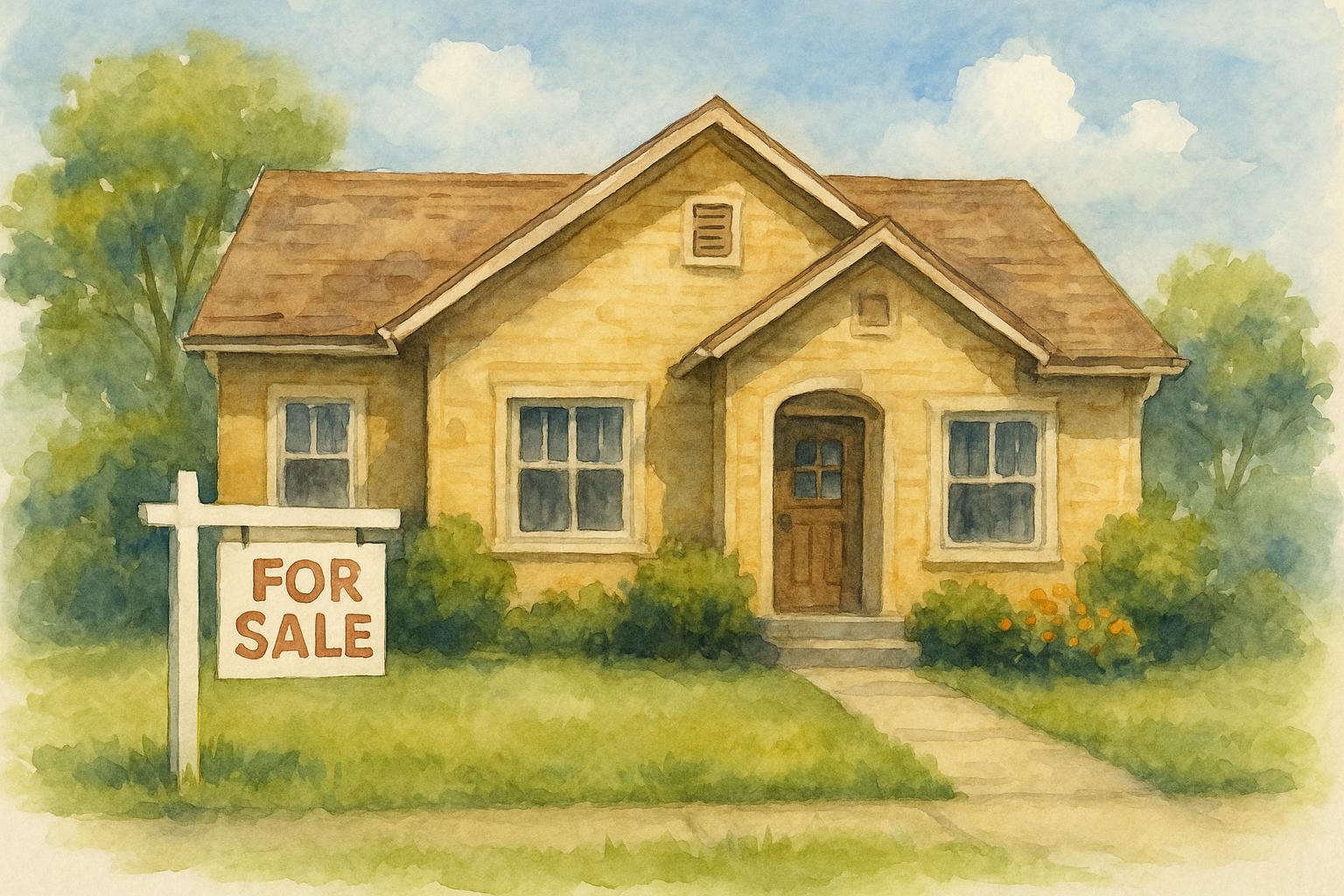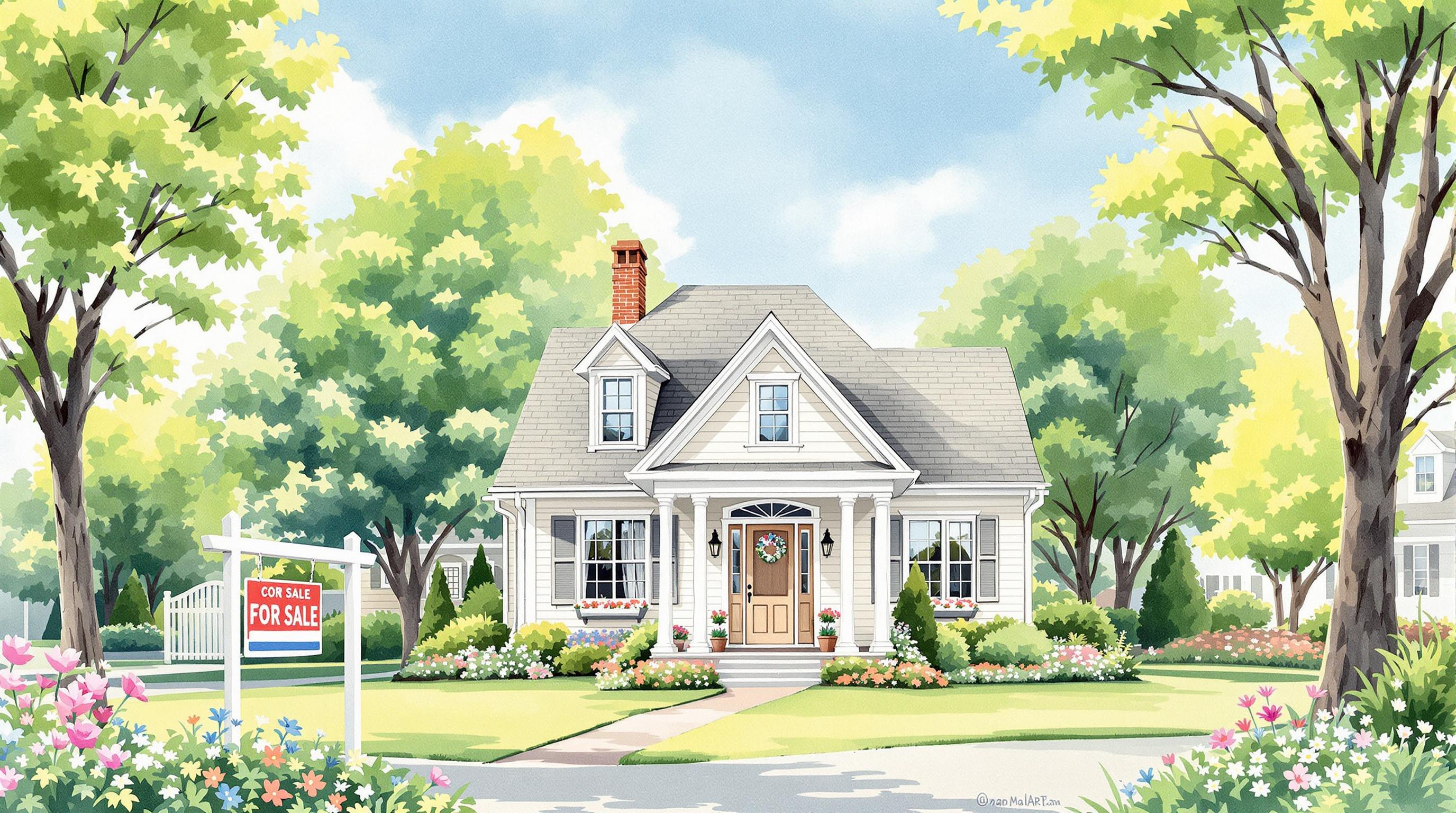Harrisburg is a top choice for real estate investors due to its affordability, growing economy, and high rental demand. Here’s why it stands out and how you can get started:
- Affordable Market: Median home price is $165,000 (61% below the national average).
- Fast Growth: Home values increased 21.3% from 2024 to 2025; Zillow predicts a 3.4% rise by the end of 2025.
- Strong Rental Demand: Average rent is $1,367, with steady growth (4.7% YoY).
- Key Neighborhoods: Options range from affordable areas like Allison Hill to high-end spots like Shipoke.
Quick Comparison of Harrisburg Neighborhoods
| Neighborhood | Median Price | Ideal For | Market Competition |
|---|---|---|---|
| East Harrisburg | $143,000 | Buy-and-hold, appreciation | Very competitive |
| Allison Hill | $104,078 | Flipping, Section 8 rentals | Moderate |
| Midtown Harrisburg | Higher range | Mixed-use, professional rentals | Very competitive |
| Uptown Harrisburg | $143,951 | Long-term rental | Growing |
| Downtown Harrisburg | Varies | Multi-family investments | High competition |
| Shipoke | Premium range | High-end rentals | Selective |
| Middletown Harrisburg | Not specified | Short-/long-term rentals | Not specified |
Pro Tip: Analyze neighborhoods based on your goals (e.g., flipping, rentals) and use tools like Redfin or Zillow for property valuations. Partner with local agents for expert guidance and stay compliant with Harrisburg’s zoning and landlord-tenant laws.
This guide simplifies your entry into Harrisburg’s real estate market - perfect for both beginners and experienced investors.
Is HARRISBURG Real Estate a Good Investment?
How to Find Profitable Neighborhoods in Harrisburg
Choosing the right neighborhood in Harrisburg can make or break your real estate investment. With its mix of vibrant and evolving areas, the city offers opportunities for everything from flipping undervalued homes to securing steady rental income. The key is identifying neighborhoods that align with your investment goals.
Start by diving into the economic health of different areas. Focus on neighborhoods with strong job markets, especially those supported by industries like government, healthcare, education, and technology. Properties near major employers often enjoy steady rental demand and stable property values, making them a safer bet for investors.
Reach out to local planning departments or attend town hall meetings to learn about future developments and zoning changes. These can reveal plans for infrastructure upgrades, new business ventures, or revitalization efforts - all of which can drive up property values over time.
Keep an eye on neighborhoods undergoing renewal projects. Areas being revitalized often offer lower entry prices before improvements are fully realized. This creates opportunities for significant value growth as the neighborhood evolves.
Tailor your neighborhood choice to your investment strategy. For example, areas with affordable homes may be ideal for flipping, while neighborhoods with good schools and low crime rates tend to attract long-term renters, particularly families.
Finally, take the time to visit neighborhoods in person. Property values can vary widely even within a small area, and scouting on the ground can help you spot hidden gems in emerging markets.
Best Neighborhoods for Real Estate Investment
East Harrisburg has been gaining attention for its rising property values. As of May 2025, the median sale price hit $143,000 - a 13.9% increase from the previous year. Homes here sell fast, typically within 13 days, and often close slightly below the list price. With a Redfin Compete Score of 78, it’s a competitive market that shows strong potential for appreciation.
Midtown Harrisburg has become a creative and business hotspot, attracting professionals, small businesses, and tech startups. Ongoing redevelopment projects are transforming the area, making it a prime location for mixed-use investments. Its competitive edge is reflected in a Redfin Compete Score of 86.
Allison Hill offers some of the most affordable entry points, with a median home value of $104,078. The neighborhood is ideal for house flippers or Section 8 landlords, thanks to its low property prices and ongoing renewal efforts. Its proximity to downtown Harrisburg adds to its appeal for renters.
Uptown Harrisburg is another area with growth potential. The median home value is $143,951, and the neighborhood benefits from revitalization initiatives aimed at improving public infrastructure and encouraging commercial development. This makes it a great choice for long-term rental investments.
Downtown Harrisburg is perfect for investors interested in multi-family housing. The area’s historic charm, cultural attractions, and proximity to major employers make it a magnet for professionals. Revitalization efforts and excellent commute options add to its investment appeal.
Shipoke caters to those seeking high-end properties. Known for its quiet, family-friendly atmosphere, it offers easy access to city amenities while maintaining a peaceful vibe. Higher rents in this area reflect its premium appeal.
Middletown Harrisburg provides a waterfront setting with plenty of dining and entertainment options. Its lower crime rates and close proximity to downtown attractions make it suitable for both short-term and long-term rental strategies.
Neighborhood Comparison Chart
| Neighborhood | Median Price | Key Advantages | Investment Strategy | Market Competition |
|---|---|---|---|---|
| East Harrisburg | $143,000 | 13.9% annual appreciation, fast sales (13 days) | Buy-and-hold, appreciation focus | Very competitive (Score: 78) |
| Allison Hill | $104,078 | Affordable entry, renewal projects underway | House flipping, Section 8 rentals | Moderate competition |
| Uptown Harrisburg | $143,951 | Revitalization efforts, affordable prices | Long-term rental, commercial growth | Growing competition |
| Midtown Harrisburg | Higher range | Creative hub, tech startup attraction | Mixed-use, professional rentals | Very competitive (Score: 86) |
| Downtown Harrisburg | Varies | Multi-family opportunities, central location | Multi-unit rentals, commercial space | High competition |
| Shipoke | Premium range | Family-friendly, quiet yet accessible | High-end rentals, stable tenants | Selective market |
| Middletown Harrisburg | Not specified | Waterfront, entertainment options, low crime | Short- and long-term rentals | Not specified |
Each neighborhood offers something different. For affordable entry points and appreciation potential, East Harrisburg and Allison Hill are solid options. Midtown and Downtown cater to professionals and mixed-use investments, while Shipoke and Middletown Harrisburg are ideal for higher-end or uniquely located properties.
The trick is finding a neighborhood that matches your investment strategy. Revitalizing areas may require patience but promise growth, while more established neighborhoods can offer immediate rental income. Use this guide as a starting point to track trends and fine-tune your approach.
Local Market Trends and Rental Demand Analysis
Harrisburg's real estate market is buzzing with activity, presenting intriguing opportunities for investors. Recent data reveals notable shifts: the median sale price jumped 21.3% to $165,000 in January 2025 but later dipped 9.94% to $145,000 by May 2025. Meanwhile, the average home value has climbed to $259,733, marking a 3.5% increase over the past year. Zillow projects this upward trend to continue, with an additional 3.4% rise by the end of 2025.
On the rental side, Harrisburg offers affordability compared to the national average. The average rent is $1,367, significantly lower than the U.S. average of $2,049. Migration patterns show an influx of residents from pricier cities like Washington, D.C., Philadelphia, and New York.
The sales pace is brisk, with homes typically going under contract within a week. Nearly 40% of homes sell above their list price, and the median time on the market was 38 days in January 2025. The sale-to-list price ratio stands at an impressive 99.6%. These figures highlight the importance of keeping a close eye on market performance.
Market Data to Track
For investors, monitoring specific metrics is key to making informed decisions. Home inventory levels, for example, play a crucial role in uncovering deals and gauging pricing trends. In May 2025, 71 homes were sold, a 26.8% increase compared to the 56 sold in the same month the previous year.
Harrisburg’s long-term appeal is bolstered by steady population growth and a stable job market, supported by its position as Pennsylvania’s capital and its strong healthcare and education sectors. These factors ensure a consistent demand for rental properties.
Rental price trends provide further insights. While rents dipped slightly by 0.1% month-over-month, they increased 4.7% year-over-year, reflecting steady growth. Keeping tabs on mortgage rates is equally important, as they directly impact buyer activity and financing costs. As Melanie Barker, C.A.R. President, explained:
"An increase in homes for sale, along with lower borrowing costs, is expected to entice more buyers and sellers to enter the market in 2025".
Other metrics, such as days on market and the price-to-rent ratio, can also signal early changes in the market.
Short-Term vs. Long-Term Rental Options
Understanding these trends is essential when deciding between short-term and long-term rental strategies. Both options cater to different investment styles and goals.
Short-term rentals in Harrisburg have shown potential for high returns. As of December 2024, properties in this category averaged $366,720 in value and generated about $40,534 in annual revenue, delivering a gross yield of 11.1%. However, occupancy rates hover around 39%, and managing these properties requires significant effort. Locations near downtown or major attractions tend to perform best.
Long-term rentals, on the other hand, offer more stability. With rents climbing 4.7% year-over-year, these properties provide consistent cash flow. Family-friendly neighborhoods near major employers are particularly well-suited for this strategy, as they attract tenants with stable local jobs.
Each approach has its advantages. Short-term rentals can generate higher income but may come with regulatory hurdles and operational challenges. Long-term rentals, while offering steadier returns, also benefit from potential property appreciation. Ultimately, the choice depends on your investment goals, management capacity, and overall strategy.
Property Evaluation Tools and Methods
When evaluating Harrisburg investment opportunities, combining digital tools with expert insights can make all the difference.
Property Valuation Calculators and Apps
Online valuation tools are a great starting point for analyzing properties, but they’re just that - a starting point. Automated Valuation Models (AVMs) use public data to estimate property values, but they have their limitations.
- Redfin: Known for its user-friendly homeowner dashboard, Redfin has a median error rate of 2.09% for on-market homes and 6.47% for off-market properties. It covers 92 million homes and updates frequently.
- Zillow: Offering the broadest coverage with 104 million homes nationwide, Zillow's median error rate for off-market properties is slightly higher at 7.49%.
- Realtor.com: This platform stands out by providing three separate valuations from independent sources, offering multiple perspectives on a property’s worth.
- Ownerly: For $1 during a 7-day trial (and $29.99 monthly after), Ownerly provides detailed property reports.
- Bank of America: A free tool that delivers quick estimates alongside comparable sales data.
While these tools are convenient, they’re not foolproof. In fact, HomeLight research reveals that online valuation tools are accurate within 7% of a home’s actual value only half the time.
"An online valuation is just an algorithm. It's very basic and may be ZIP code-driven - it might not even be community-specific. A computer doesn't take into account the extra analyses performed by an agent or appraiser." - Joe LoCicero, Real Estate Agent at 54 Realty
To get the most out of these tools, compare estimates across multiple platforms, then validate your findings with a professional appraisal or agent's expertise. These initial figures set the stage for deeper financial analysis.
Financial Metrics for Property Analysis
Once you’ve estimated a property’s value, the next step is to assess its profitability. Three key metrics help guide investment decisions: cash flow, cap rate, and return on investment (ROI).
- Cash Flow: This is the net income you’ll have each month after covering all expenses. Calculate it by subtracting total monthly costs - like mortgage payments, taxes, insurance, maintenance, and a vacancy allowance - from your gross rental income.
- Cap Rate: This measures the annual return you can expect if you paid cash for the property. To calculate, divide the Net Operating Income (NOI) by the property’s market value. For instance, if a Harrisburg property generates $20,000 in NOI annually and costs $250,000, the cap rate is 8%. Investors typically aim for cap rates between 5% and 10%, with higher rates often linked to higher-risk properties and lower rates indicating more stable investments.
- ROI: Unlike cap rate, ROI reflects the total return over your entire ownership period, including cash flow and property appreciation. For example, if you buy a property for $200,000, invest $20,000 in renovations, and sell it five years later for $300,000, your ROI would be 36%.
Cap rate provides a snapshot of annual performance without considering financing, while ROI factors in the entire investment timeline, including leverage effects. Many investors aim for total returns of 10% or more.
By crunching these numbers, you’ll gain a clearer picture of a property’s potential profitability. From there, local expertise can further refine your strategy.
Working with Central PA Realty

Quantitative analysis is only part of the equation - expert guidance is equally essential. Central PA Realty offers free real estate consultations across Harrisburg and Dauphin County, tailoring advice to the local market.
Their agents specialize in Harrisburg neighborhoods and provide Comparative Market Analysis (CMA) reports that are far more precise than online tools. While digital tools rely on algorithms, CMAs incorporate local MLS data and professional verification.
For serious investors, a professional appraisal - typically costing $350 to $500 - offers the most accurate valuation. Central PA Realty can help coordinate appraisals and guide you in interpreting the results within the context of your investment strategy.
Local experts also bring insights that online tools miss, like upcoming development projects or zoning changes. By blending digital estimates with professional expertise, you’ll be well-equipped to maximize your investment opportunities in Harrisburg.
sbb-itb-7fa5722
Local Regulations and Investment Optimization
Navigating Harrisburg's regulations is essential for safeguarding your investment and reducing legal risks. Familiarity with local zoning laws, landlord-tenant regulations, and compliance requirements can help you protect your assets while ensuring steady returns. Let’s break down what you need to know about zoning rules and tenant laws in Harrisburg.
Zoning Rules and Landlord-Tenant Laws
Harrisburg is divided into zoning districts, each designed to support community growth while prioritizing public health and safety. These districts specify allowed land uses, which may be permitted outright, require special exceptions, or be prohibited altogether. Before buying any property, confirm its zoning classification to avoid potential issues like condemnation due to zoning violations.
The city’s zoning classifications include residential, commercial, institutional, industrial, and specialized overlay districts, such as Floodplain and Historic zones. Ignoring zoning rules can lead to fines, project delays, and even insurance complications. For rental properties, ensure the property is zoned for multi-family use if you plan to rent to multiple tenants or convert single-family homes into rental units.
Pennsylvania’s landlord-tenant laws add another layer of legal obligations. In Harrisburg, rent increases for current tenants are capped at 10% annually, with a mandatory 90-day written notice. Security deposits are limited to two months’ rent during the first year and drop to one month after two years of occupancy. Additionally, landlords are required to maintain properties in a safe, livable condition, ensuring essentials like working smoke detectors, reliable heating, sufficient hot water, and a leak-free roof. Tenants also have the right to "quiet enjoyment", meaning landlords must provide reasonable notice before entering the property, except in emergencies.
Compliance Tips and Risk Management
To stay compliant, use lease templates reviewed by a legal professional. These templates should include necessary disclosures, such as information on security deposits, lead-based paint for homes built before 1978, and any pre-existing property damage.
Keep detailed records of repairs, tenant agreements, and communications to demonstrate compliance. For tenant screenings, always obtain written consent for credit checks and notify applicants of any adverse actions based on their credit reports. Follow the Fair Housing Act guidelines to avoid discrimination based on race, religion, disability, nationality, sex, or familial status.
Address repair requests promptly to prevent tenants from using Pennsylvania’s "repair and deduct" rule, which allows them to deduct repair costs from their rent if issues aren’t resolved in a timely manner. If eviction becomes necessary, strictly adhere to Pennsylvania’s eviction procedures, including providing proper notice, to avoid delays and added expenses. Additionally, check whether your property requires a rental license under Harrisburg’s ordinances, as operating without one can lead to fines and legal trouble.
For added peace of mind, consider hiring professionals to streamline compliance. This could include property management companies that handle tenant screening, lease preparation, and maintenance coordination, or local attorneys who specialize in landlord-tenant law.
Working with Local Real Estate Professionals
Local expertise can be a game-changer when navigating regulations. Central PA Realty, for example, offers free consultations to help property owners in Harrisburg and Dauphin County understand zoning requirements and compliance standards. Their agents can guide you toward properties that align with your intended use and connect you with contractors, property managers, and legal professionals who specialize in Pennsylvania’s landlord-tenant laws.
"Renting a home or apartment can be a significant and stressful process. It is made only more difficult if you don't understand the laws that govern landlords and tenants in Pennsylvania. Our guide clearly and concisely outlines those laws so Pennsylvanians can rent with confidence." – AG Shapiro
Professional property management services can handle the day-to-day responsibilities of compliance, from tenant screening to lease drafting and maintenance coordination. Though these services come at a cost, they can save time and reduce legal risks, especially for landlords managing multiple properties. Real estate attorneys can also provide additional protection by reviewing lease agreements, assisting with evictions, and ensuring your strategy aligns with local regulations.
Building a network of reliable contractors, property inspectors, and maintenance professionals is another way to stay ahead of compliance issues. These experts are well-versed in local building codes and can help address potential problems before they escalate.
The Pennsylvania Office of Attorney General offers a Consumer Guide to Tenant and Landlord Rights, which outlines the responsibilities of both parties. Staying informed about regulatory updates and leveraging professional resources can help you protect your investment while achieving success in Harrisburg’s rental market.
Key Takeaways for Harrisburg Real Estate Investment
Harrisburg stands out as a promising market for real estate investment, thanks to its affordability, diverse economy, and strategic location. As of January 2025, the median sale price for homes was $165,000. Home prices had climbed by 21.3% year-over-year, with 39% of properties selling above their list price. The city's economy benefits from a mix of government, healthcare, education, and technology sectors, along with easy access to major East Coast cities - creating a solid foundation for investment opportunities.
To succeed in this market, focus on three key areas: location analysis, financial planning, and professional guidance. Start by researching local market trends to identify neighborhoods with high demand. Look for areas with strong potential for rental income, and be sure to evaluate factors like property taxes, insurance, maintenance, and management costs. It’s also wise to set aside an emergency fund for unexpected repairs and understand the tax obligations tied to rental property ownership.
When selecting properties, prioritize those with strong rental demand. Key metrics like cash flow, cap rate, and ROI can help gauge a property’s earning potential. Additionally, consider the property's proximity to important amenities such as schools, hospitals, shopping centers, and public transportation, as these can significantly impact tenant appeal and long-term value.
Partnering with knowledgeable local professionals can simplify the process. Central PA Realty, for example, offers free consultations to guide investors through zoning laws, compliance requirements, and the specific nuances of the Harrisburg market.
"I purchased my first investment property with the help of the team at KCA Central PA. It went so well and so smoothly that we just closed on my second investment property. They are definitely investment property pros, and I won't go anywhere else!"
– Jim Thompson, Mechanicsburg, PA
Zillow predicts a 3.4% rise in home values by the end of 2025, adding to Harrisburg's appeal. Combining affordability, economic stability, and ongoing infrastructure improvements, the city offers opportunities for both novice and experienced investors. Tapping into local expertise is essential to navigating this dynamic market effectively.
FAQs
What should I look for when choosing a neighborhood to invest in real estate in Harrisburg, PA?
When you're exploring neighborhoods in Harrisburg, PA, for real estate investment, it's important to weigh a few key factors. Look for areas that offer easy access to essential amenities like schools, hospitals, and shopping centers. Neighborhood safety is another critical aspect - communities with lower crime rates and a stable environment tend to attract both renters and buyers, making them a safer bet for investment.
You might also want to consider emerging neighborhoods with affordable property prices and the potential for future growth. Take Allison Hill, for example - this area could present promising opportunities for higher returns as it continues to develop. To make the most of your investment, stay informed about local market trends and rental demand. These insights can guide you toward smarter decisions and better returns.
What’s the best way to evaluate if an investment property in Harrisburg is profitable?
To evaluate whether a property in Harrisburg is worth investing in, start by focusing on a few essential financial factors. Pay attention to the purchase price, expected rental income, and cash flow. A simple guideline to consider is the 2% rule, which suggests the monthly rent should equal at least 2% of the property’s purchase price.
For a deeper dive, calculate the gross rental yield. You can do this by dividing the annual rental income by the total purchase price, including any acquisition costs. Be sure to account for ongoing expenses like property taxes, maintenance, and insurance to get a more accurate picture of your potential returns. Additionally, research Harrisburg’s rental demand and local market trends - these insights can guide smarter investment decisions.
By blending these approaches, you’ll gain a better understanding of the property’s potential profitability and whether it aligns with your long-term investment goals.
What zoning laws and local regulations should I know about before investing in rental properties in Harrisburg, PA?
Understanding Harrisburg's Property Regulations
Before diving into rental property investments in Harrisburg, it’s crucial to get familiar with the city’s zoning laws and local rules. For example, Harrisburg designates specific zoning districts like R2, which permits single-family homes and duplexes. Ensuring your property fits within the allowed uses for its zoning district is a key first step.
Planning to run short-term rentals? You’ll need to secure a city-issued license. On top of that, all rental properties in Harrisburg must be registered annually. The city's Codes Department handles property licensing, building codes, and safety inspections, so staying on top of these requirements is non-negotiable if you want to avoid fines or legal trouble.
Spending some time understanding these regulations upfront can save you headaches later and set you up for a smoother, more successful investment journey.



